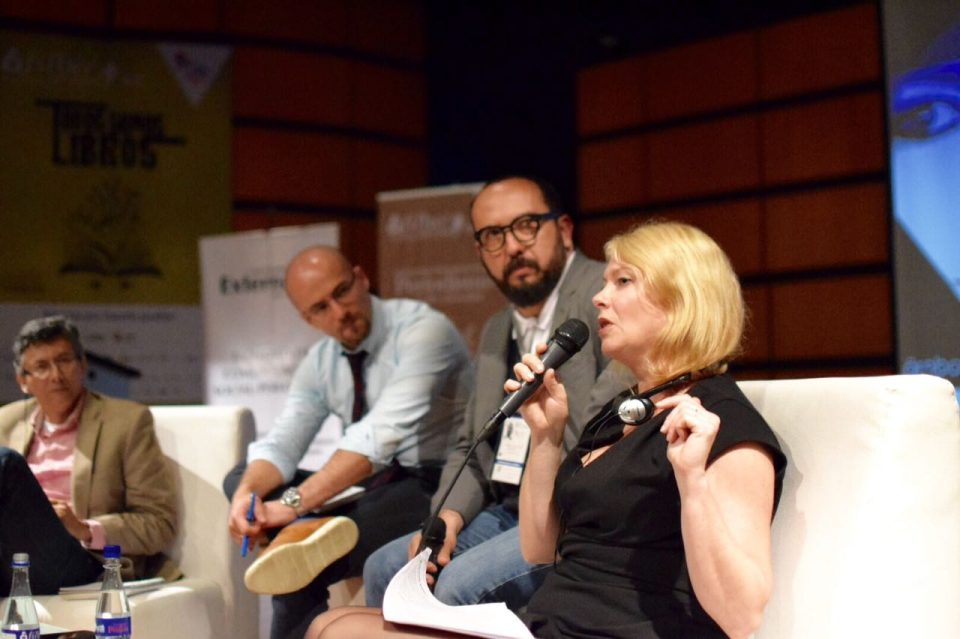
Ülrika Kamberg addresses the audience at the Encuentro de Periodismo. Photo: conexionexternado.com
Post-truth, critical thinking and responsibility in the changing world of journalism in Colombia, as discussed by Colombian and international guests at FILBo 2017’s ‘Encuentro de Periodismo’.
Journalism in Colombia is at an interesting point in its history. Every day, websites such as Las Dos Orillas, La Silla Vacía and even VICE gain significant traction on the traditional news sources. It’s certain that journalism is changing rapidly. Some changes reflect worldwide trends, while others are more localised.
FILBo is not just about literature and this year there was an important section dedicated to journalism in Colombia. Co-hosted by the Externado university, the ‘Encuentro de Periodismo’ featured a number of chats between important figures in the field from both home and abroad.
The idea of post-truth is currently in vogue among international journalists. Trump is but one facet of this tendency, although he garners disproportionate coverage through his idiocy. Referencing the US president, the Externado’s own Daniel Aguilar commented that “alternative facts is simply a euphemism for lies.” He went on to say that “people, on the one hand, approach media without critical thinking, just absorbing and reproducing whatever mass media say. But on the other hand, there is a big chunk of people who think they are critical against mass media, reproducing fake news. Thus we become what Marshall McLuhan pointed out when he said that if we didn’t approach media with critical thinking we would become a sexual reproducer of it.”
Joining Aguilar on the quest for quality was Jorge Iván Bonilla, who criticised the idea of rubbish news. As he pointed out, not all opinions can hold equal weight, and nor should they. After all, those that believe the world is flat should simply be ignored. He furthermore went on to say that there is too much focus on “voices of rubbish, who are loud but in fact say little.”
Adding to the debate, Ülrika Kamberg explained the situation in Sweden, saying that “Sweden now is going backwards.” She too was critical of the view that everyone’s opinion is equally valid as she claimed, “Sometimes there are things that are just facts. The truth is important.” An encouraging trend that Kamberg highlighted was the idea of ‘viral investigators’. These are “young people in Sweden, who dedicate their time – and it’s not easy – to finding the truth and investigating these viral trends.”
The trend of left-wing/liberal superiority came up a few times. It was pointed out that right-wing groups in both Europe, the USA and Colombia have recently been far better at presenting their message than the left. Kamberg blamed this on the fact that liberal thinkers often come across as arrogant or condescending, which opens the way for the bizarre situation where wealthy players such as Trump or Farage are seen as defenders of the weak and marginalised.
Encouraging media consumers to think critically has long been a problem, especially with online media. Perversely, in a world where investigating claims has become easier and easier, there is a greater preponderance of falsity. Aguilar blamed this on what he termed “a critical thinking problem.” He bemoaned the fact that many students are quick to believe what they see, especially on social media. Bonilla encouraged us to think about who exactly has the authority to decide “who lies, or does not lie”. He pointed out that an independent press is crucial in this matter, as they should examine everyone’s words and actions, not just one side or the other.
After a rolling debate taking in various subjects, the encounter ended on a positive note. Ülrika made an impassioned plea to the crowd of mostly university students that they should “not be nervous” and that they should organise, investigate and be active. Aguilar also had positive words for the students in attendance, noting that many of his students at the university were good and would go on to be strong journalists.
Journalism in Colombia is never an easy profession, and we are all too aware of the risks faced by our fellow journalists every day here. Outside the relative safety of the big cities, that situation is yet worse. However, this is also a time in which good journalism is needed more than ever, as it comes under attack from moneyed interests, from the march of vapidity, from an avalanche of lies and – if we look to our neighbours in Venezuela and Ecuador – from state censorship, too.
We live in a world where the truth has become harder and harder to identify and that is why good journalism should stand up and perform its critical role in society. The responsibility is not only with us as journalists, but also with all of you reading as consumers.





